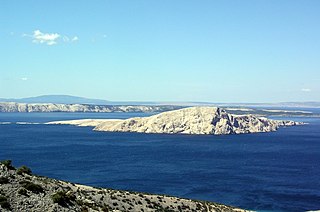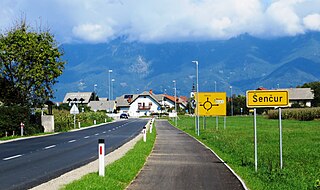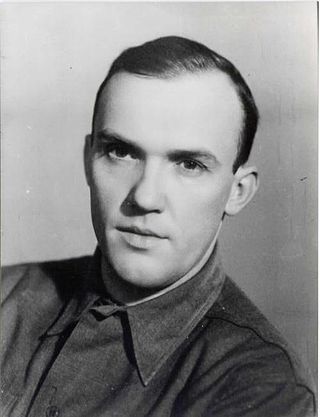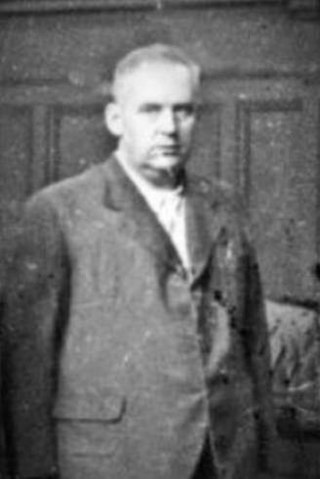
TIGR, fully the Revolutionary Organization of the Julian March T.I.G.R., was a militant anti-fascist and insurgent organization established as a response to the Fascist Italianization of the Slovene and Croat people on part of the former Austro-Hungarian territories that became part of Italy after the First World War, and were known at the time as the Julian March. It is considered one of the first anti-fascist resistance movements in Europe. It was active between 1927 and 1941.

Goli Otok is a barren, uninhabited island that was the site of a political prison which was in use when Croatia was part of Yugoslavia. The prison was in operation between 1949 and 1989.

Prevalje is a town in northern Slovenia. It is the seat of the Municipality of Prevalje. It lies in the traditional Slovenian province of Carinthia. Prevalje lies in a valley where the Meža River emerges from a narrow gorge, full of fluvioglacial sediments. To the north the town is bounded by the Strojna, Stražišče, and Dolga Brda hills. To the south are Navrski vrh and Riflov vrh.

Kočevje is a town and the seat of Municipality of Kočevje in southern Slovenia.

Vrhnika is a town in Slovenia. It is the seat of the Municipality of Vrhnika. It is located on the Ljubljanica River, 21 km from Ljubljana along the A1 motorway.

Leon Rupnik, also known as Lav Rupnik or Lev Rupnik was a Slovene general in the Kingdom of Yugoslavia who collaborated with the Fascist Italian and Nazi German occupation forces during World War II. Rupnik served as the President of the Provincial Government of the Nazi-occupied Province of Ljubljana from November 1943 to early May 1945. Between September 1944 and early May 1945, he also served as chief inspector of the Slovene Home Guard, a collaborationist militia, although he did not have any military command until the last month of the war.

Šenčur is a settlement in the Upper Carniola region of Slovenia. It is the seat of the Municipality of Šenčur.

Jože Snoj was a Slovenian poet, novelist, journalist and essayist. He was awarded the 2012 Prešeren Award for his lifetime work and rich literary opus.

Vladimir Šubic was a Slovene architect. He designed several moderate functionalist buildings in Ljubljana, most notably the Nebotičnik skyscraper, which was the tallest building in Yugoslavia upon its completion. His architectural design was rational and economic, following metropolitan patterns and American high-rise examples.

Matej Bor was the pen name of Vladimir Pavšič, who was a Slovene poet, translator, playwright, journalist and Partisan.

Angela Vode was a Slovenian pedagogue, feminist author and human rights activist. An early member of the Communist Party of Yugoslavia, she was expelled from the Party in 1939 because of criticism against the Hitler-Stalin Pact. During World War II, she joined the Liberation Front of the Slovenian People, but was expelled in 1942 because of disagreements with the Communist Party of Slovenia. In 1944, she was interned in a Nazi concentration camp. After the war, she was arrested by the Yugoslav communist authorities, trialed at the Nagode Trial and imprisoned for several years. After her release from prison she was excluded from public life for the rest of her life. In the 1990s, she became one of the foremost symbols of victims of totalitarian repression in Slovenia.
Boris Furlan was a Slovenian jurist, philosopher of law, translator and liberal politician. During World War II, he worked as a speaker on Radio London, and was known as "London's Slovene voice". He served as a Minister in the Tito–Šubašić coalition government. In 1947, he was convicted by the Yugoslav Communist authorities at the Nagode Trial.

Igor Torkar was the pen name of Boris Fakin, a Slovenian writer, playwright, and poet best known for his literary descriptions of Communist repression in Yugoslavia after World War II.
Podlesje is an abandoned settlement in the Municipality of Kočevje in southern Slovenia. It was a village inhabited by Gottschee Germans. During the Second World War its original population was expelled. The area is part of the traditional region of Lower Carniola and is now included in the Southeast Slovenia Statistical Region.

Matija Škerbec, was a Slovene Roman Catholic priest, political figure, and writer.
Inlauf is a remote settlement in the Municipality of Kočevje in southern Slovenia. The area is part of the traditional region of Lower Carniola and is now included in the Southeast Slovenia Statistical Region. Its territory is now part of the village of Borovec pri Kočevski Reki.

Ludvik Mrzel was a Slovene writer, poet, dissident and journalist.

Črtomir Nagode was a Slovenian politician and geologist.

Franc Snoj was a Slovenian politician and economist.

The Nagode Trial was a political show trial in Slovenia, Yugoslavia in 1947.